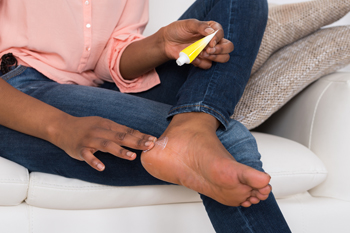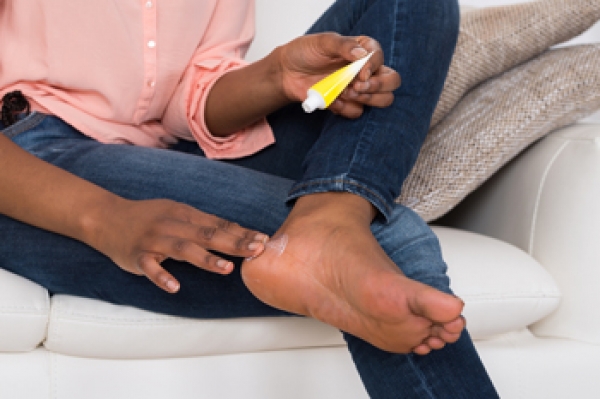 Heel fissures often occur with cracked heels. Fissures are deep cracks in the skin of the heel that can cause severe pain and discomfort. They often develop as a result of standing on hard surfaces for the majority of the day or from wearing shoes that have an open back such as flip flops. Cracked heels can also form in the warmer months. Additionally, patients who have existing medical conditions such as psoriasis or eczema may be prone to developing cracked heels. The cracks will generally develop on the side of the heel, as daily activities are accomplished. Some patients find it helpful to soak their feet in warm water, followed by using a good moisturizer. Severely cracked heels can become infected, and it is strongly recommended that you consult with a podiatrist if you suffer from this condition.
Heel fissures often occur with cracked heels. Fissures are deep cracks in the skin of the heel that can cause severe pain and discomfort. They often develop as a result of standing on hard surfaces for the majority of the day or from wearing shoes that have an open back such as flip flops. Cracked heels can also form in the warmer months. Additionally, patients who have existing medical conditions such as psoriasis or eczema may be prone to developing cracked heels. The cracks will generally develop on the side of the heel, as daily activities are accomplished. Some patients find it helpful to soak their feet in warm water, followed by using a good moisturizer. Severely cracked heels can become infected, and it is strongly recommended that you consult with a podiatrist if you suffer from this condition.
If the skin on your feet starts to crack, you may want to see a podiatrist to find treatment. If you have any concerns, contact Dr. Joshua David Scoll from Pennsylvania. Our doctor can provide the care you need to keep you pain-free and on your feet.
Cracked Heels
It is important to moisturize your cracked heels in order to prevent pain, bleeding, and infection. The reason cracked heels form is because the skin on the foot is too dry to support the immense pressure placed on them. When the foot expands, the dry skin on the foot begins to split.
Ways to Help Heal Them
- Invest in a good foot cream
- Try Using Petroleum Jelly
- Ease up on Soaps
- Drink Plenty of Water
Ways to Prevent Cracked Heels
- Moisturize After Showering
- Skip a Shower
- Keep Shower Water Lukewarm
- Don’t Scrub Your Feet
If you are unsure how to proceed in treating cracked heels, seek guidance from a podiatrist. Your doctor will help you with any questions or information you may need.
If you have any questions, please feel free to contact one of our offices located in Philadelphia, Bensalem, and Fairless Hills, PA . We offer the newest diagnostic and treatment technologies for all your foot care needs.

